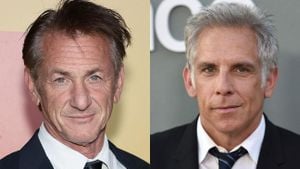Robert De Niro’s acclaimed career takes on new dimensions as he stars in Netflix’s latest political thriller, "Zero Day," where he portrays George Mullen, the former president called back from retirement to confront one of the most devastating cyber attacks the United States has ever faced. Set against the backdrop of political intrigue and national panic, Mullen must navigate the treacherous waters of contemporary governance, where threats may lurk from within as much as from outside the nation.
From the moment the series begins, viewers are thrust deep within chaos: energy supplies falter, satellites are lost, and all semblance of organization crumbles as the cyber attack paralyzes the nation’s infrastructure. The show's creators—Eric Newman, Noah Oppenheim, and Michael Schmidt—effectively capture the essence of fear gripping the country, recalling real-world anxieties over cybersecurity.
De Niro’s involvement undoubtedly elevates the series. Not only does he lend weight and credibility to the role, but his performance reflects the gravitas and burdens of leadership. “I keep thinking,” said Lizzy Caplan, who plays his daughter, Congresswoman Alexandra Mullen, “that I would have been perfectly content just to have been in the background of some of his scenes.” Such admiration from Caplan points to De Niro’s significant impact on the milieu of the project.
Despite its gripping premise, the series has received mixed reviews. Critics have pointed out the somewhat clichéd plot elements and predictability. "Zero Day" delves headfirst not just through the mechanics of political maneuvering, but also through the psychological landscapes of its characters. Explicitly, the series highlights how Mullen grapples with his past and the ethical challenges he encounters as he attempts to solve the crisis.
Recurring themes crop up throughout, such as the vigilant nature of security and the ever-growing presence of technology. De Niro's character often serves as the embodiment of political ‘old guard,’ having historical awareness and calling upon past lessons to confront unprecedented situations of modern technology and information warfare. This reflects broader societal concerns about how the past influences the present.
Across the spectrum of commentary, opinions vary significantly, with some critics arguing the series lacks originality, describing its moments of tension as tired stereotypes of American power struggles. The political game being played often feels secondary to character development centered around De Niro's Mullen.
"Zero Day" posits questions about trust, reliability, and the nature of security as the plot thickens. Will it be foreign adversaries attacking, corrupt financial players seeking chaos, or internal political agendas endangering the nation? Mullen, faced with his internal demons and the chaotic external environment, embodies the quest for truth amid constructs of social disarray spawned by misinformation, reminiscent of current global phenomena.
With the show’s focus, the atmosphere of uncertainty resonates deeply, allowing audiences to question their own worlds—a clever move by the show’s creators. Between Mullen’s pursuit of truth and justice, there is also the implication of self-inquiry within the political character, raising awareness of the shared responsibilities of leadership.
For all its potential pitfalls, "Zero Day" thrives intensely on De Niro’s portrayal. His ability to embody Mullen’s emotionally charged and politically nuanced identity acts as the glue binding the narrative's various threads. Mullen’s struggles are amplified by the external pressures imposed by the catastrophe faced, creating dynamic tension.
The series remains engaging, prompting viewers to ponder the state of American politics today. Some critiques focus on the overextensive exploration of certain political dialogues and how these could disengage viewers, but the overall narrative manages to maintain grip through its relatable elements.
Discussions on the nature of truth Tn these turbulent times mirror the series itself, as both reflect the society's concerns, fears, and usefulness of foresight. With the finale looming, both audiences and critics alike are left wondering how George Mullen will navigate this perfect storm.
While some skeptics highlight flaws and tropes, the allure of political drama and De Niro’s performance inevitably keep viewers linked to the screen, awaiting the twists and turns of this gripping story.
Despite its flaws, the series’ exploration of contemporary issues lends it relevance and makes it worthy of attention, leading one to ponder beyond plot circumstances. Will it set the stage for De Niro's consistent appearances or strengthen future Netflix series with comparable narratives? Only time will tell.



